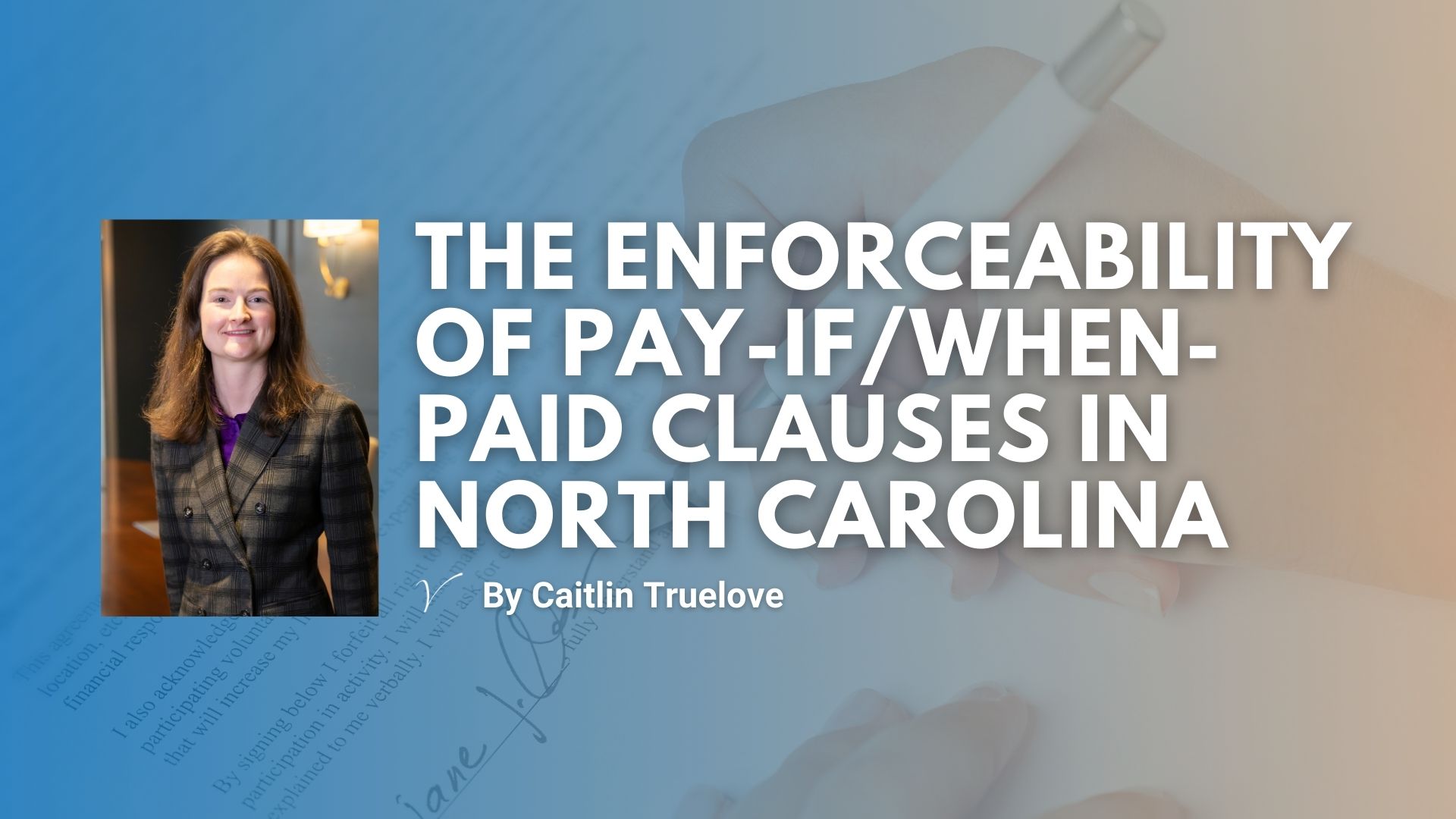The Enforceability of Pay-If/When-Paid Clauses in North Carolina
By Caitlin S. Truelove
Attorney at Law

Construction contracts often include provisions governing payment terms between general contractors and subcontractors. One such provision is the "pay-if/when-paid" clause, which dictates that a subcontractor will receive payment only after the general contractor has been paid by the project owner. While "pay-if/when-paid" clauses may be enforceable in Arizona, Colorado, Georgia, Florida, Illinois, Michigan and Maryland, such clauses are unenforceable in the state of North Carolina.
Our legislature viewed that such contract terms that specifically intend to shift the risk of loss related to non-payment downward to lower-tiered subcontractors to be so inequitable and patently unfair that the legislature passed into law the North Carolina Prompt Pay Act. In fact, the North Carolina Prompt Payment Act (N.C. Gen. Stat. § 22C-2) specifically states: “Payment by the owner to a contractor is not a condition precedent for payment to a subcontractor and payment by a contractor to a subcontractor is not a condition precedent for payment to any other subcontractor, and an agreement to the contrary is unenforceable.”
Any contract term which makes payment to a contractor or subcontractor, the condition of payment to a lower-tiered subcontract is unenforceable as against public policy in North Carolina. However, if a term setting the deadline for payment was drafted into the "pay-if/when-paid" clause, the timing of payment provision may be enforceable if it is reasonable. This means that if the contract clause states: “contractor will pay subcontractor within seven (7) days of receipt of payment from the project owner,” while the condition of payment is unenforceable, the requirement of payment within seven (7) days may be enforceable and contractor’s failure to pay the subcontractor within seven (7) days of subcontractor’s demand for payment may be unenforceable. While such clauses may reasonably delay payment to subcontractors, they may not indefinitely withhold it.
The Courts in North Carolina have ruled that a general contractor must pay the subcontractor within a reasonable time, even if the owner has not paid the general contractor.
Practical Considerations for Subcontractors:
- Be aware of statutory protections under the North Carolina Prompt Payment Act.
- Consider requiring payment bonds or other financial assurances on projects.
- Consider drafting a clause in the construction contract that will allow you to terminate the contract without consequence to yourself if there are continued issues with non-payment from higher-tiered subcontractors or the contractor.
Conclusion
Subcontractors are entitled to payment within a reasonable time, regardless of whether the general contractor has received funds from the owner. Given the legal and financial risks involved, contractors and subcontractors should carefully review contract language and seek legal advice to ensure their interests are protected. The attorneys at Vann Attorneys, PLLC have experience in reviewing and drafting construction contracts and can assist you by explaining the obligations and pitfalls associated with the contract and propose more favorable contract terms for you.
Wisdom, Experience, Results
Learn More from Vann Attorneys
Vann Attorneys stands ready to meet the diverse needs of clients ranging from individuals to privately held family businesses to corporations with national distribution. The firm represents clients throughout North Carolina and the United States. We periodically publish content that is relavant to our clients and community. Keep reading our 'News & Events' page on the topics most important to you and your business.
Proven
Experience on
Your Side
Leave a message
Raleigh Office
RALEIGH HOURS
| Mon | 8am - 5pm |
|---|---|
| Tues | 8am - 5pm |
| Wed | 8am - 5pm |
| Thurs | 8am - 5pm |
| Fri | 8am - 5pm |
Charlotte Office
CHARLOTTE HOURS
| Mon | 8am - 5pm |
|---|---|
| Tues | 8am - 5pm |
| Wed | 8am - 5pm |
| Thurs | 8am - 5pm |
| Fri | 8am - 5pm |



